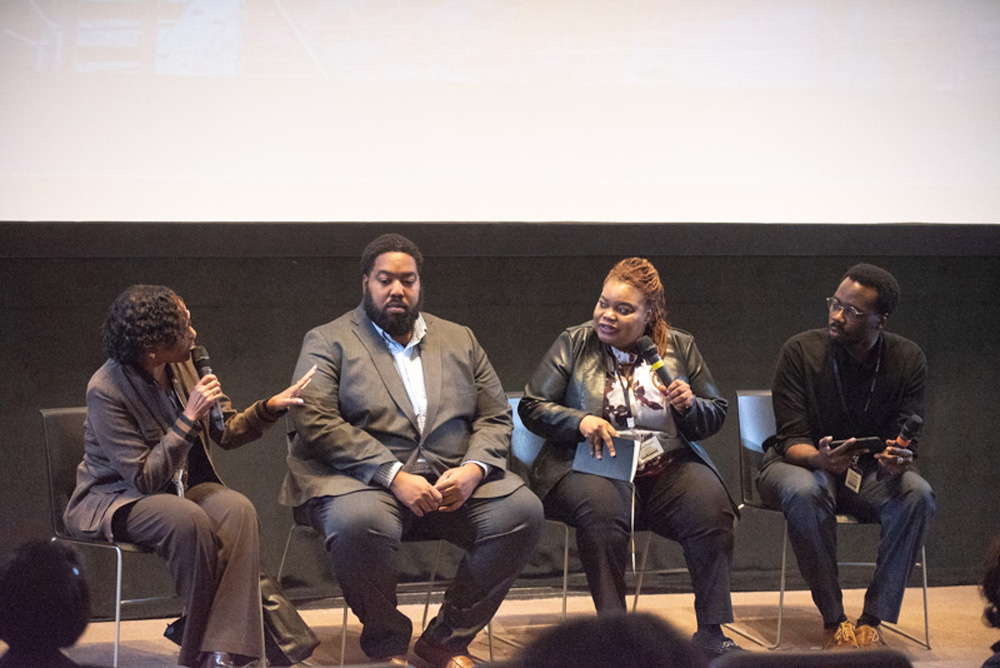Legacy Black Media Companies Still Battling Myths
While researching leading publishers of color for a recent report, Democracy Fund senior fellow Tracie Powell became intrigued by independent

While researching leading publishers of color for a recent report, Democracy Fund senior fellow Tracie Powell became intrigued by independent newspaper publishers who had successfully launched vibrant local online editions.
The AFRO-American Newspapers of Baltimore and Washington and The Atlanta Voice have long chronicled their communities in newsprint. But to stay relevant in today’s world and “meet readers where they are,” the organizations have entrusted a younger generation of journalists to bring their papers into the digital age.
Despite their success, Powell told attendees at the 2018 LION Summit on Thursday at Columbia College in Chicago that legacy black media companies still battle some myths. One of them is that the legacy newspapers do not have an online presence.
This premise was rebuffed by Frances ‘Toni’ Draper, publisher of the 125-year-old AFRO-American Newspapers. Draper said she has prioritized “linking” older and younger readers on digital. That’s why her organization joined Facebook in 2008, and has built up an impressive 667,000 followers. When the organization held a recent career fair, they did more than list the participants. They set up a studio on site and interviewed 25 employers on Facebook Live about their opportunities, so the information could be viewed and shared online by digital audience.
Marshall Lattimore, editor-in-chief of The Atlanta Voice, which was launched in 1966, has grown his company’s Instagram following from 700 to 3,500 followers in the short time he's been with the company.
Both post updates to their sites daily, and in breaking news situations.
Another myth, Powell said, is that black media is “dying.”
Not so, said Draper, who shared that as an independent chronicle of American history that is still producing content, her newspaper archives, including reporter’s notebooks and unpublished photos, are now being sought by schools who want to offer a more meaningful retrospective of black history in America.
Co-moderator Tyree Worthy, the publisher of the 2-year-old Gentilly Messenger, said some media organizations thrive in non-traditional ways. He has found that in his New Orleans community, sometimes it is most effective to communicate via small articles on social networks like Nextdoor and Facebook.
And finally, Powell said there is a myth that black legacy media lacks journalistic standards.
The AFRO-American newspapers have always kept very high standards, Powell said, because the staff is aware of their far-reaching influence and impact past their home bases of Baltimore and Washington, D.C.
She said that over the years, the AFRO-American newspapers have built important relationships with politicians, church and government leaders, and they are responsive to them still. Veteran reporters are not above being fired for irresponsible reporting at this paper of record, Powell explained in an anecdote. She also was proud to state she recently found proof of the newsroom’s adherence to standards when she stumbled upon the company’s own newsroom stylebook, dated 1932.
At The Atlanta Voice, Lattimore is keeping the publication relevant by introducing its offering to multiple generations, maintaining high standards and telling great stories – like the real consequences of low voter registration and low turnout among black voters.
In closing, Powell, a member of the LION Publishers board of directors, said that legacy black publishers still face challenges, like being over-represented on digital platforms that are not controlled by them, but by third parties who have the potential to interfere with their audiences.
Also, these digitally savvy publishers are not necessarily finding the help and support they need from the nationwide National Association of Black Journalists or the National News Publishers Association, a trade group of 200 African-American trade associations, because they do not share a focus on hyperlocal publishing.
“So there is a need for a home for them. And that’s where LION comes in to play,” she said.
Sign up for the weekly newsletter
Join the LION mailing list to get our weekly roundup of opportunities and resources for news entrepreneurs. View our most recent issues.
Related Articles
How five LION members are maximizing revenue and community engagement through events
Whether you’re a solopreneur or part of a larger team, there are in-person event opportunities for everyone.
Jess deRivera joins LION Publishers as our Membership Services Manager
She’ll help provide a seamless experience to current and prospective members.
Four big opportunities that local news publishers can pursue right now
Here’s how to capitalize on each one.
